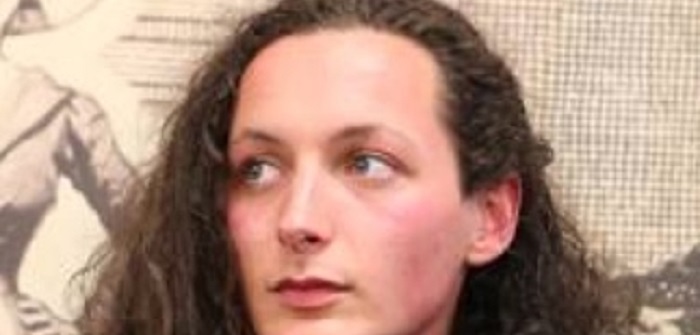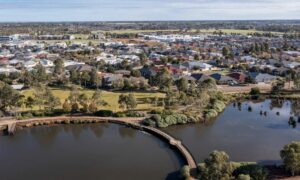CJ McLean sits down with Welcome the Bright World director Charles Sanders, ahead of the upcoming House Of Sand production in collaboration with State Theatre Company of South Australia.
At the time of this interview, the cast and crew are approximately three weeks out from opening night—not that you’d know it talking to Sanders. He is wired and alert, and measured in thought and intention. Co-artistic director of House of Sand, Sanders grew up in Canberra doing musical theatre, then grew into plays. It is this rich early relationship with art that clearly informs his attitude to the industry now. ‘I knew the etiquette of the theatre [from my early education], and I had a respect for the challenges and the process of what it is to put on a work of theatre, that I think was pretty rare.’
Sanders’ work with House of Sand sees him travel between Sydney and Adelaide, as well as his hometown and across the waters, in Wellington. I ask how he’s found working between these two cities.
‘The two cities are really culturally different. On a city perspective, I love that Sydney is big and brash and bold, and keeps you ambitious. And I love that Adelaide is welcome, and supportive, and community-driven. And I think that the creative fields could probably be seen in that way too. Which is not to say that there aren’t little pockets of comfort and security in Sydney, and there aren’t big bold things happening in Adelaide. I’ve found a nice balance between the two, at least thinking of them that way.’
It’s clear though that Sanders holds a lot of love for the State Theatre Company. ‘When I was at acting school [AC Arts], I was in one of those really lucky years that gets to be in the ensemble of a State Theatre company show, which happens late once every 10-15 years. So, I was the Herald in King Lear. I got to walk on say…I don’t know, 20 words?
‘It’s always been a very welcoming and wonderful place to work. The staff are so supportive. We couldn’t do this production without them—it’s invaluable the amount of support that has given to us, to do a big ambitious project.’
The cast are wrapping up for the day when I arrive, and I ask how rehearsals are going. ‘It has been going incredibly well, considering how incredibly huge and complex this play is. We’re really blessed to have the most amazing team of actors, who are just bringing their all to it.
‘Terry Crawford, who’s playing the lead role of Max, he has actually played this role once before in 1984. When the play was two years old, he was in a student production of it at NIDA, as a third-year graduate student.’ I ask about his own relationship with the play.
‘I instigated this project with my conspirators, Stephen Sewell and Terry, way back in 2015. […] As part of [my NIDA] course—because NIDA’s a very privileged institution—they take the directing students to Berlin for a month. And as is my habit when I travel internationally, I take a bunch of books that are set in the place that I’m going to. And the original 1982 script of Welcome the Bright World was one of them.
‘Around that time, a friend of mine asked a question on Facebook—a Dear Face Hive kind of question, about what the difference is between religious cultural and ethnic Judaism.
‘Terry put a response to that question, saying, “For a really interesting artistic response to […] that question, have a look at Stephen Sewell’s Welcome The Bright World. […] And it was from there that I learned that Terry had played the role once before, and Stephen also works at NIDA, and so I was working with him on another project, and so that also came together and we cooked up this idea to do a new production.’
It’s clear that Sanders’ relationship with this play extends far beyond what the average audience might see. I ask if he might find presenting a play with such huge and mind-boggling themes daunting for an audience.
‘It’s not going to be Priscilla. That’s not what we’re in competition with!
‘But what is beautiful about the play, and what I think is our constant pursuit as a team creating it, is to make it so that the story is told clearly, and that if the themes excite you, they are clearly addressed, and accurately addressed, and you can get inside them.
‘It’s essentially a family drama, that gets hi-jacked […] halfway through by a homeland-style political thriller. And, those two plots form the kind of centre of the play plot-wise, and what all audiences I think will be excited to hold onto, and get inside of.’
After the recent That Eye, The Sky, family seems to be a prevalent theme with the State Theatre Company at the moment. ‘I think it’s prevalent in art. I think the family unit, whether it be a nuclear family, or an alternative family structure—[…] that’s our frame of references of humans, and what we pin our sense of self and humanity on.’ And it absolutely frames Sanders’ own history with theatre; House of Sand is a family industry through and through, shared with Sanders’ sister Eliza. I ask how he has found working so closely with family.
‘Yeah, I mean—90% of the time, working with family is the best, most rewarding possible creative people, because we’re so close, that we can bypass all of the bullshit.
‘Eliza and I have had—we’ve learnt not to do now, as we’ve worked together—but we’ve had screaming matches in front of collaborators that they thought were real life-changing fights, and to us is just…how we communicate!
‘There’s no punches pulled when you’re working with people that you have this baseline of absolute love and respect for.
‘There are also tensions. And those tensions are, to me, even though they’re really difficult to navigate, what sets House of Sand’s work apart from what either of us would do individually, and what else I see around me in the industry. […] Eliza comes from a deeply sematic, investigative, art-as-therapy kind of process, and I come from a much more intellectual, dramaturgical, product-driven kind of process. And we infect each other’s processes in a way that can be really confronting, but means that the work we produce has an element of the other.’
I ask if the themes that attract Sanders’ are the same now as when he first began in theatre. ‘Yes and no. Mostly no, to be honest. […] it’s easy to narrativise looking back, but I think it’s easy to say that I developed an interest in theatre that looks at the large political world through an intimate personal family and personal-based lens in the last few years of high school and acting school. And that remains a pretty solid thread through my work.’
This very nicely encapsulates—explains, even—why Sanders is mounting Welcome the Bright World now. ‘It’s such a beautiful and prescient piece of work. It’s astounding how near premonitory it feels—the politics, and the identity politics, the discussion around identity politics, and where you place your primary identity.
‘Every time I read it over the course of “15, “16, “17, as political events unfolded, and commentary around politics and identity politics [unfolded]—I thought, It’s gotta be done! It’s so relevant right now.
‘I think for audiences now, perhaps not quite so much in Australia yet […] I think this is the next kind of time when young people are really going We are fricking fed up with the system!’
Sanders apologises, not sure if he can swear. I say go for it. ‘We are f***ing fed up with the system, as it stands! And really holding the feet to the flames of the leaders of our society. Very much like the youth in Berlin were doing at this time.’ I ask if he might hope that a play such as Welcome the Bright World might help give younger generations the tools and language to speak about politics more confidently?
‘I hope that that sense of standing up, and fighting for what you believe to be true is received by people in a way that might send them out into the world a little more changed, a little more willing to do that for themselves.
‘But also, I suppose that comes with a warning too, to not let yourself be blinded by idealism […]. The play has a warning in it that we need to be open to our perception of the world shifting as new information comes to hand, and that’s true in the scientific field, it’s true in the political field, and it’s true in the personal realm too.’
‘I think that, as a human society we are ill-served by abandoning the conceit that the truth is out there, and we can find it. The idea of living in a post-truth society, where everything is subjectivity, everything is identity, everything is alternative facts […] I don’t think we serve ourselves well as a species by thinking that way.
‘But I think we also have to appreciate that some elements of truth are subjective and personal, and entertaining that […] is probably one of the most difficult things about being human.
‘But I think [it] can be one of the most rewarding to grapple with.’
Charles Sanders is a director, dramaturge, and theatre maker, and resides in both Adelaide and Sydney. Charles has worked in the arts since the age of 5; first as a classical boy soprano, then as a musical theatre performer, an actor, and since 2010 as a director and producer.
In late 2014, with dancer/choreographer (and sister) Eliza Sanders, Charles established this new company, ‘House Of Sand’ creating work through and across art-forms including dance, theatre, cabaret and visual art.
The company’s first three works Pedal.Peddle, Castles and Knitting While Sleeping – all choreographed by Eliza Sanders with Charles serving as dramaturge – have toured throughout Australia and New Zealand and brought the company substantial critical and popular acclaim, and accolades including the Wellington Fringe Festival Most Promising Emerging Company award, and a nomination for Best in Fringe at that same festival.
STC and House of Sand’s production of Welcome the Bright World previews on Thursday 20th September, and opens Friday 21st September at the Queen’s Theatre. To find out more and book tickets, visit
statetheatrecompany.com.au/shows/welcome-the-bright-world/
Charles Sanders was interviewed by CJ McLean. To find out more about CJ’s work, please visit https://cjmcleansite.com/





















